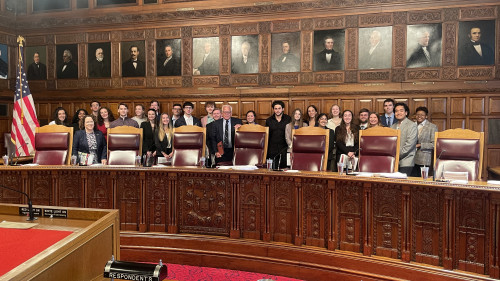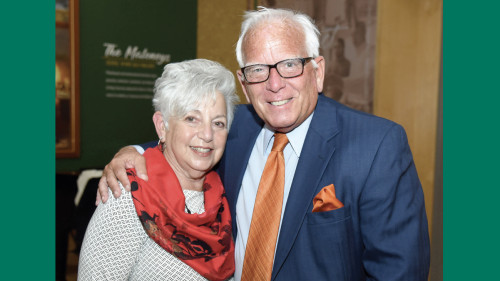
Stench is a strong word, and when you use it to critique the U.S. Supreme Court, it’s sure to spark discussion.
Siena hosted the September 16 presentation “The Supreme Court’s Legitimacy and the Stench of Politics” for its annual Constitution Day observation. Ava Ayers, J.D., associate professor of law at Albany Law School, was the featured speaker.
She noted that when the Supreme Court announced its decision in June on Dobbs v. Jackson Women’s Health Organization, effectively ending the federal right to abortion, it raised two urgent questions. First, which rights are next? Will the right to obtain contraception, or marry someone of the same sex or a different race be impacted? Second, did the decision affect the perceived legitimacy of the highest court in the land?
“Why do we trust, respect and obey institutions, such as the Supreme Court, that we may vehemently disagree with?” asked Ayers. “Is it inevitable simply because they have been in existence for so long? And is that trust actual or merely perceived?”
The S-word in the lecture’s title was prompted by a carefully calibrated remark made last December by Justice Sonia Sotomayor during oral arguments in the Dobbs case. Observing that states were passing ever-stricter abortion laws, she asked, “Will this institution survive the stench that this creates in the public perception that the Constitution and its reading are just political acts? I don’t see how it is possible.”
Ayers asked her Siena audience to note that while citizens may disagree with the Court’s decisions, they should consider whether the justices were chosen fairly, and whether the legislators who voted to approve their appointments were also elected fairly and in a truly representative manner.
Alli Tsamis ’23 and Kiley Lenahan ’23 helped organize the Constitution Day event in their respective roles as president of Siena’s Pre-Law Society and vice president of the Political Science Society.
“The legitimacy of the Supreme Court is a very relevant topic for anyone, but especially for college students whose rights may be restricted because of the Court’s decisions,” said Tsamis. “Know who your U.S. senators are, and express your views to them.”
Lenehan noted that the increased political polarization in our country could lead citizens to question the legitimacy of the American court system, but that as citizens we have a say in the process.
“We don’t have the power to elect judges,” she said, “but we do have the power to elect the legislators who nominate and approve them. We need to pay attention to court decisions regardless of whether we have a legal background.”
Leonard Cutler, Ph.D., professor of political science and pre-law advisor, said he was “heartened” by the student response – and high turnout – for event.
“For the past seventeen years we have celebrated Constitution Day at Siena by presenting interesting and provocative programs for our students focusing on the significance of our Constitution and its application to our twenty-first century citizenry, even though this enduring living document is rooted in the latter part of the eighteenth century.”
Constitution Day is an American federal observance that recognizes the adoption of the U.S. Constitution and those who have become American citizens. It is observed on September 17, the day in 1787 that delegates to the Constitutional Convention signed the document in Philadelphia.

